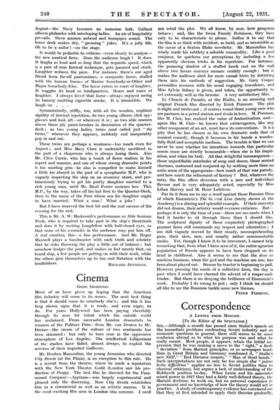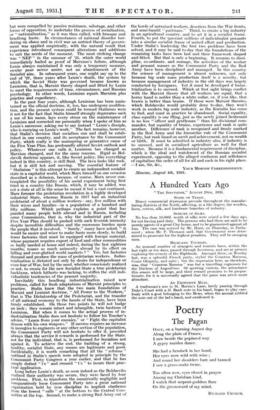Correspondence
A LETTER FROM Moscow.
[To the Editor of the SPECTATOR.]
Sra,—•Although a month has passed since Stalin's speech on the immediate problems confronting Soviet industry and on economic questions in general, there still seems to be some confusion abroad as to what his purpose was and what he really meant. Most people, it appears, retain the initial im- pression that he was making a move to the " right," a fresh " deviation " from Marxist principles, or as newspaper head- lines in Great Britain and Germany condensed it, " Stalin's new NEP," " Red Dictator recants," " Man of Steel bends." Such interpretations are not only far too simple (for " potius leetio difficilima" applies no less to Soviet politics than to classical criticism), but argues a lack of understanding of the Bolshevik position to-day. When Lenin and his associates seized power in 1917 they had a fairly well-defined theory, the Marxist doctrine, to work on, but no personal experience in government and no knowledge of how the theory would act in practice. A study of contemporary evidence has convinced me that they at first intended to apply their theories gradually,
but were compelled by passive resistance, sabotage, and other forms of opposition, to undertake the process of socialization, or " nationalization," as it was then called, with brusque and headlong haste. In circumstances of national disorder bor- dering on chaos and in civil war an untried theory of govern- ment was applied empirically, with the natural result that experience introduced consequent alterations and additions to suit the needs of the moment. The most striking change was " NEP " in the summer of '21, which the outer world immediately hailed as proof of Marxism's failure, although Lenin always maintained it was only a temporary measure, recular pour mieux saute?, not an abandonment of the Socialist aim. In subsequent years, one might say up to the end of '27, three years after Lenin's death, the system by which the Soviet State was governed became known as Leninism, that is, Marxist theory shaped and fitted by Lenin to meet the requirements of time, circumstance, and Russian psychology. In other words, Leninism equals Marxism plus practice and expediency.
In the past four years, although Leninism has been main- tained as the official doctrine, it, too, has undergone modifica- tion, and the present system could be termed Stalinism were it not for the fact that Stalin himself strongly deprecates such a use of his name, lays every stress on the maintenance of Leninism and corrected me personally when I spoke of him as Lenin's successor, asking me to say instead " Lenin's disciple, who is carrying on Lenin's work." The fact remains, however, that Stalin's decision that socialism can and shall be estab- lished in one country, and its acceptance by the Communist Party, which really is the mainspring or generative cause of the Five Year Plan, has profoundly altered Soviet outlook and policy. Whatever one calls it, Leninism has changed as Marxism changed, and for the same reasons. Rigid as Bol- shevik doctrine appears, it, like Soviet policy, like everything indeed in this country, is still fluid. The lava looks like rock, but it is still hot and moving. The essential feature of " Stalinism " is this attempt to create an independent socialist state in a capitalist world, which Marx himself on one occasion described as a delusion, because, of course, Marx never con- templated the possibility of his social experiment being first tried in a country like Russia, which, it may be added, was not a state at all in the sense he meant it but a vast continent. Marx foresaw the proletarian revolution in a highly developed industrial State, whereas Russia in 1917 had an industrial proletariat of about a million workers—say, five million with their wives and families—in a population of a hundred and fifty millions. Which perhaps explains a point that has puzzled many people both abroad and in Russia, including some Communists, that is, why the industrial part of the Five Year Plan should be pushed with such feverish intensity despite incredible difficulties and the enormous burden upon the people that it involved. " Surely," many have asked, ' it would be easier and wiser to make haste more slowly, to build fewer factories that must be equipped with foreign material, whose payment requires export of food and other commodities so badly needed at home and indeed, during the last eighteen months; rouses so much animosity abroad by its effect on falling and over-glutted world markets ? " Yes, but factories demand and produce the mass of proletarian workers. Indus- trialization is dictated not only by desire for independence or even fear of War, but by the need, whether consciously realized or not, to create for the new Socialist State a true proletarian backbone, which hitherto was lacking, to stiffen the still indi- vidualistic tendencies of the peasant majority.
Inevitably this headlong industrialization raised new problems, called for fresh adaptations of Marxist principles to practice. Stalin knew that the two main foundations of Marxist and Leninist doctrine, " All Power to the Workers," that is The Dictatorship of the Proletariat, and the transfer of all national economy to the hands of the State, have been firmly established. On those two points he will not budge an inch ; they remain intact and intangible, twin bastions of Leninism. But when it comes to the actual process of in- dustrialization Stalin does not hesitate to follow his Teacher's advice, " Learn from your enemies," or " Fight the capitalist demon with his own weapons." If success requires an increase in incentive to engineers or any other section of the population, the Communist Party will not hesitate to offer it, provided always that the service it rewards is performed for the State. not for the individual, that is, is performed for Socialism ..not against it. To achieve the end, the building of a strong, healthy, socialist State, any means are legitimate and good. Incidentally, it is worth remarking that all the " reforms " outlined in Stalin's speech were adopted in principle by the Communist Party Congress a year earlier, and that he has simply dotted " i's " and crossed " t's " to insure their prac- tical application.
Long before Lenin's death, as soon indeed as the Bolsheviks realized their authority was secure, they were faced by four Problems. First, to transform the numerically negligible and comparatively loose Communist Party into a great national organization held by iron discipline to implicit obedience from the lowest " cells " at the bottom to the Central Com- mittee at the top. Second, to make a strong Red Army out of the horde of untrained workers, deserters from the War fronts, and semi-bandit " partizans." Third, to create a big industry in an agricultural country, and to set it in a socialist frame. Fourth, to put the ignorant millions of individualist peasants into a similar socialist frame of united effort and production. Under Stalin's leadership the first two problems have been solved, and it may be said to-day that the foundations of the remaining tasks have been laid and their framework shaped and fitted. But that is only a beginning. It remains to disci-
pline, co-ordinate, and e, the activities of the worker and peasant masses as the mmunist Party and the Red Army have been disciplined and managed. In this country the science of management is almost unknown, not only because big scale mass production itself is a novelty, but because management of industry in the old days was largely conducted by foreigners. Yet it must be developed if Indus- trialization is to succeed. Which at first sight brings conflict with the Marxist theory that all workers are equal, that a horny hand is nobler than a white collar, or, if you like, that brawn is better than brains. If those were Marxist theories, which Bolsheviks would probably deny to-day, they won't work in modern big scale industry, as the Kremlin has come to find, and must in practice be abandoned. Social equality, class equality is one thing, just as the newly joined lieutenant is no less " officer and gentleman " than his divisional com- mander, but equality of brains, experience and rank is quite another. Difference of rank is recognized and firmly marked in the Red Army and the hierarchic rule of the Communist Party, but rank based on merit and achievement, not on wealth or birth. It must be admitted in industry also, if industry is to succeed, and in socialized agriculture as well for that matter. Because it is a fundamental requirement of discipline, which is the ideal and watchword of the Russian socialist experiment, opposing to the alleged confusion and selfishness of capitalism the order of all for all and each in his right place. —I am, Sir, &c.,
YOUR MOSCOW CORRESPONDENT.
Moscow, August 4th, 1931.































 Previous page
Previous page